Alumni Resources
About the University
By C. L. Stambush

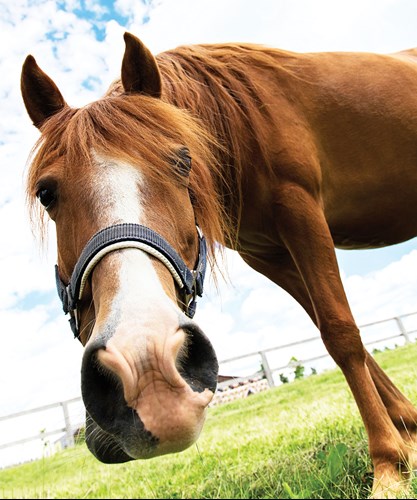
Glenn Ballard, instructor in mathematics, celebrates life with an attitude of gratitude and has a passion for horses and numbers. His love of steeds began when he was 3 years old, but he had to wait until he was 51 to get his first, a Morgan named Cory. Retired from teaching math for 40 years at Evansville’s Harrison High School, Glenn (grandfather to seven and recent great grandfather) joined USI’s Pott College of Science, Engineering, and Education faculty to continue teaching mathematics, a passion that has never dimmed. “Teaching it energizes me. Even if I go to class tired or saddened by an event, or not feeling well, I nearly always feel fine once I start talking about math with my students.”
5 a.m. Wake and head to the barn as the sun begins to rise, listening to rustling leaves, crowing roosters, meowing cats and nickering horses anticipating breakfast. “After graining the horses, I check on the chickens, ducks, rabbits, barn cats and dogs before turning the horses out.” A light breakfast, then leave for campus.
7:30 a.m. Arrive at USI and settle in, checking emails and polishing lessons. “I chose to be a math teacher as a lifetime career when I was a 17-year-old high school senior. I think the problem-solving skills learned in mathematics are transferable to other disciplines.”
9 a.m. – 3 p.m. Teach three algebra and/or calculus classes, with breaks and office hours in between. “I keep about 20 office hours. I like doing most of my preparation and grading at school, and I like being accessible to my students.”
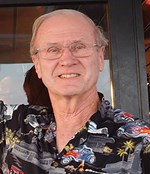
3 – 5 p.m. Head home to corral and grain the horses, feed the fowl and other critters, do farm chores. “There is always something that needs fixing, repairing and tending. We have 11 acres with a Southern Colonial home and six outbuildings, including the horse barn. Friends and local grandchildren help me keep the horse barn clean and the property maintained.”
5 – 7 p.m. Dinner at favorite restaurant with love of life, wife Carol, often with friends and family. “On Thursday evenings we participate in Fresh Air Community of Faith, a young progressive church in which we are charter members.”
7 – 10 p.m. Read, watch TV or attend an athletic event one of the grandchildren might be playing in. “Before falling asleep, I try to catch up on some reading—periodicals, progressive Christianity, or math and science related. I often play a game of Tetris on an old Gameboy because it clears my head.”
Quote: “As I grew older, I became less and less judgmental. Before we criticize someone’s decisions, we should consider what their options were. I have learned to be more compassionate toward my students without lowering my standards. Age gives you a perspective that is not possible when you are young. I think making friends across the economic strata, the educational strata, the ethnicity strata, etc. will enrich your life.”

Yu-Li Alice Shen, instructor in English, is an award-winning playwright and consummate giving millennial. Born in Taipei, Taiwan, she’s written four full-length, four one-act and three 10-minute plays. Two were produced in Evansville. Alice’s days are long and packed with academics, meetings, theatre, friends and more. “I’m in contact with my students and colleagues almost constantly. It’s a point of pride with me. I review and amend lesson plans, attend department/committee meetings or participate in professional development/training sessions. Ten minutes before class, I sit in my office, in the dark, and relish the calm before the storm.”
8 a.m. Wake. Spend an hour in bed scrolling Instagram admiring colorful city murals, creative photo manipulation and the “solipsistic yet aesthetic art of marketing your own ‘brand.’”
9 – 11 a.m. Kickboxing or elliptical at the Y. Shower, eat a deconstructed sandwich or cold veggie hotdogs while watching Netflix reruns, select an outfit for work. “I’m into fashion and its myriad social, historical and environmental implications.”

11 a.m. – 6 p.m. Arrive on campus to teach writing, literature and how to “adapt language, thought process and research skills to the shifting rhetorics in our digital society.” Hold office hours, grade small assignments, attempt to advise students on degree and life plans. Curate the drama section of Southern Indiana Review. Preside over a board meeting of WillowTree of Posey County, an advocacy center for victims of domestic violence and sexual assault.
6 – 10 p.m. Explore Evansville’s food, bars and art scenes, participate in local theatre community, “I do some kind of theatre exercise, whether that be as an actor, playwright, musician, stage manager, designer, audience member or critic.” Attend a club meeting: Evansville Swing Cat, Bourbon Society or Uke.
10 – midnight Grade papers, work on own current creative projects, pay bills, plan out-of-town adventures via Airbnb. “For the past two years, I’ve been on a ‘life-share’ kick. Depending on the kindness of strangers does spark some joy within me.”
midnight – 2 a.m. Shower and bed with a crossword puzzle or book. Check Facebook—passively catching up with friends and news. Asleep by two. “I can’t remember my dreams. They are blurry, like there’s a Hefe filter around the edges.”
Quote: “I have a friend from college who jokes that I never left school. I go to poetry readings, science lectures, world culture celebrations and post pictures on social media as if I were still a student myself. Maybe it’s a crutch—never exiting the comforting womb of academe or the manufactured world of image-making. But maybe there’s just never a lack of new and beautiful things to learn and appreciate.”

Roberto Campos ’14, journalism, is a communication specialist for a civil engineering company by day, with a side hustle passion for photographing music festivals and shows on nights and weekends. “Photographing a festival can be a mad rush. It’s a lot of waiting with spurts of intense action trying to capture vivid moments in a short amount of time in unideal conditions—temperature, packed photo pits, lousy angles, etc. I love it.” This passion has allowed him to travel domestically and abroad, a taste he acquired as a USI exchange student in Japan.
9:30 a.m. – 2 p.m. Get up, drink mint tea, recheck packed gear—Canon camera and lens, Polaroid, notebook, SD cards, hard drives/computers, clothes. Drive to Chicago. Look for free parking.
2 – 9 p.m. Pick up press pass at festival media tent, wait in line to get into photo pit. Photo the first three songs allowed then rush to next stage to wait in line. Rinse and repeat until festival day ends. “I can usually sneak in food and a beer here and there.”

9 p.m. – 2:30 a.m. Head to after-show or bar with media friends. “We often discuss the trials and tribulations of what we do, how the advent of things like Instagram has desensitized people to the value of what we provide as photographers.”
2:30 – 7:30 a.m. Friend’s house to sleep on floor/couch, charge iPhone, load SD card to MacBook Pro to transfer while sleeping, charge camera battery for next day.
7:30 – 9:30 a.m. Wake and make sure images transferred, delete previous day’s photos from SD card, shower.
9:30 – 11 a.m. Edit and post three to five images on social media. “I go through the photos from the day before, write down the file numbers of the photos I’d like to edit, usually 15-20. I shoot around 250 per three songs. 10% of which are usable.”
11 a.m. Pack gear for second festival day, get breakfast/lunch at the festival, apply sunscreen—being sunburnt isn’t fun while photographing. Repeat another day filled with amazing music, hopefully capturing amazing moments, and trying not to take a single moment for granted. Drive home.
Bulk editing photos. “Deadlines are Tuesday nights usually. I edit using Adobe Photoshop and upload photos to Dropbox to share the file with the publication that I’m covering the show or festival for, NUVO or My Old Kentucky Blog, usually.
Quote: “My fears are that I’ll miss out on a great opportunity in life and become stagnant. This leads me to try and pursue whatever opportunities are presented to me—friendships, experiences and especially things off the beaten path.”
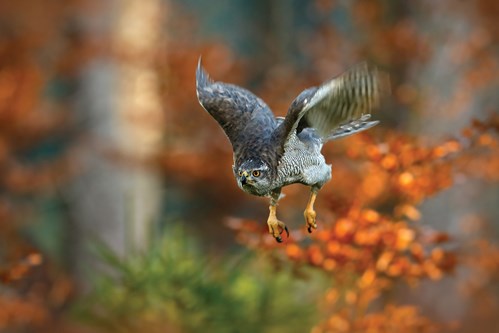
Rachel Bacher ’17, environmental science, feels most alive when she is out in the woods alone working as a biological science technician for the Black Hills National Forest or hiking to the top of a mountain on weekends where she can see for miles. Her work, surveying raptor habitats for activity, has led to some dangerous situations, like an attack from a Northern Goshawk during a seasonal position in Michigan in the Huron-Manistee National Forest. “This goshawk was relentless. He/she kept hitting the back of my head with his feet and wings, even when I ran behind a tree.”
5:45 a.m. Wake to Benny (dwarf rabbit) digging at bed’s blanket. Coffee, breakfast, fill water bottles and bladder, pack lunch, second breakfast and snacks. Feed and water Benny and Sandy (dwarf hamster).
7 – 7:30 a.m. Arrive at office to pick up geographic information system (GIS) maps for that day’s work site, and any other equipment. Gas up the truck and head out to field.
7:30 - noon Patrol known raptor territories or proposed timber sale sites. On raptor patrol—Northern Goshawk, Turkey Vulture, Golden Eagle, Osprey—surveying for active nest occupation. Listen for raptors, inspect ground for whitewash (bird poo), feathers, bones, dead prey, etc. Look out for a silent birds flying around. “Northern Goshawks are very aggressive, territorial raptors, and I am required to wear a hard hat and safety glasses.”
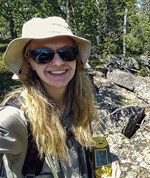
Eat a snack, more raptor surveying or timber-sale site surveys, making sure there are no sensitive/endangered species or habitats that need protection—Oreohelix (snails), raptors, snakes, Horned Lizards, beavers, etc. in the sale sites.
Noon – 12:30 p.m. Lunch in the field.
12:30 – 5:30 p.m. Continue surveys, assist in building steel gates of closed caves/mines—confirmed White Nose Syndrome in bats, eat snacks. “My baby this year is the Pollinator Project! There has not been much research and/or monitoring on the Black Hills with pollinators, specifically butterflies and bees.”
6 – 9:30 p.m. Return home, fix dinner, water porch garden, feed Benny, play with Sandy, fish for trout at nearby lakes with a worm and bobber, prep for next work day. Trivia at the local Irish pub Thursday nights.
9:30 p.m. Bedtime. “Benny hops up and does laps on my bed, maybe licks my forehead, then hops down to his bed next to mine – his nightly routine – which signals to me it’s time to sleep.”
Quote: “I strive to follow the path that makes me the happiest and has the most impact, whether that is with people, the world, or just my community. Life has taught me that nothing is guaranteed. Nothing will be handed to you on a silver platter without hard work and determination. Life is unfair; how you deal with it determines who you are and how far you’ll go in life.”
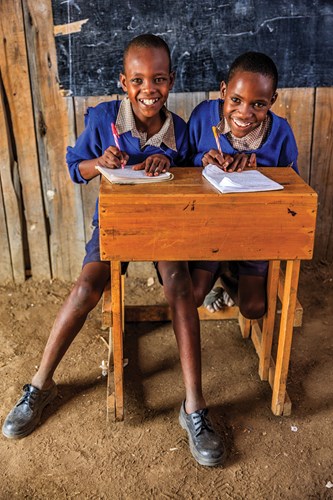
Jean Marie Uwimana ’20, is a triple major—mathematics, economics and computer science—with an 18-hour credit load who was born on the road to Zimbabwe, as his parents and 10 siblings fled the horrors of the 1994 Rwandan Genocide. Although he has never met one of his seven brothers (but hopes to after graduation), he talks to another one daily about how far they’ve come since the Tongogara Refugee Camp in Zimbabwe and gets updates on their parents. He and a high school friend, Panashe, started the nonprofit AfriCan to educate, expose and empower high school students in Zimbabwe. “We do what we do to challenge the status quo that certain career paths are more valuable than others.”
6 – 9 a.m. Wake and run solo or with Screaming Eagles Running Team, training for 5K, 7K and 10K USI-hosted runs. Shower and check to-do list. If nothing is labeled “urgent,” walk to the Loft for breakfast, read email, Yahoo Finance or listen to Ramin Djawadi’s song Light of the Seven.
9 – noon Classes, meet with professors, check to-do list and complete tasks during class breaks. “I might have something like: Finish Along Came A Spider, book room for TechInclusion meeting or call mom etc. As I cancel out completed tasks, it feels great, no matter how small the task. Somedays, small wins make my day.”

Noon – 12:15 p.m. Lunch at Chick-fil-A, Fiesta Fuego or The Loft. “Adjusting to new food was tough when I came to the United States. I stick to the food I know is good for me.”
12:15 – 4:30 p.m. Classes or job in Provost Office, touch base with Panashe in Zimbabwe on AfriCan projects, meet with professors. “I have amazing professors that are flexible and meet with me during my available hours. Juggling three majors, I take all the help I can get from my professors.
4:30 – 5 p.m. Dinner in The Loft, mostly pasta, then study. If it’s Friday, play pool or the video game FIFA with friends.
5 – 10 p.m. Study in library’s quiet room, cell on silent and out of sight. “I take study intervals of two hours because studying for long hours yields diminishing returns. I take 30 minutes to an hour breaks.” Check to see daily tasks are complete. “If nothing is urgent, I read the book on my list. I always have an interesting book on my list, because growing up I never had novels or books to read.”
Midnight Meditate for five to 10 minutes. “I sleep for six hours and then another beautiful day to be alive begins.”
Quote: “Life is like a tree where branches represent the different choices you have that mold you into the person you are today. Nutrition, soil, water, etc. represent resources and opportunities you receive from everyone around you. Like a tree, I want to be successful and give back to my community a hundredfold.”
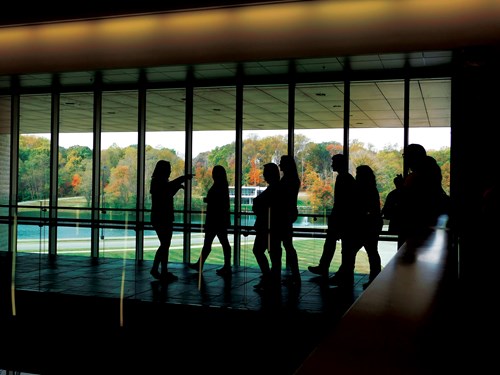
Tanvi Asthana ’20, biochemistry, is one of only four students in her incoming class to be awarded a B/MD scholarship. In addition to her academics, she is a volunteer in the Student Ambassador Organization, giving tours to potential high school students interested in USI and sharing her college experiences with them. She’s involved with professional student chemistry organizations and has gone on a medical mission trip with USI’s Timmy Global Health chapter. “As I educate myself at USI, I try to think about how I can do my part in mitigating current issues in the world.”
6:30 – 8 a.m. Wake, eat breakfast—fried egg and avocado on toast—one cup of coffee with a splash of almond milk. Pack lunch if not done the day before. Get ready while listening to podcasts: Sawbones, Throughtline, Hidden Brain, Planet Money.
8 – 9 a.m. Arrive on campus, plan the day, respond to emails, contact professors, take a walk or review notes for exams.
9 – noon Classes in major Monday/Wednesday/Friday, nonmajor classes Tuesday/Thursday. Lead Student Ambassador Organization tours. “I wanted to give back to USI, which worked out perfectly, since SAO is a volunteer position. I love being a member of this organization because I get to help foster curiosity and hopefully spark a passion in high school students.”
Noon – 1:30 p.m. Lunch from home or sushi from Simply to Go, Chick-fil-A, Red Mango in the Redwood Lounge or Chemistry Student Lounge. Relax, indulging in Netflix or Hulu: Brooklyn Nine-Nine, Shameless, New Girl.

1:30 – 5 p.m. Chemistry or biology labs. “We get to do a lot of interesting experiments at USI, and this time allows the students and professors to get to know each other a lot better.”
5 – 7 p.m. Dinner packed from home and club meetings—American Chemical Society, Timmy Global Health. “Everyone in these organizations is extremely passionate about what we do. It’s great to be in an environment where we feel like we can make a difference.”
7 – 10:30 p.m. Library’s fourth floor to study in a cubby or table next to a window. “I always make sure I have a dry erase board with markers to study.” Weekends – dinner with friends, watch a movie and hang out.
10:30 – 11 p.m. Go home, brush teeth, wash face, put on pajamas and bed.
Quote: “I am carving out a path where I can continue to grow as a person and continue to make myself better. If all goes well, the path will lead me to achieve my aspirations—both personal and professional.”